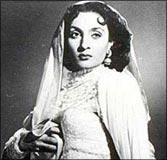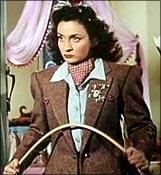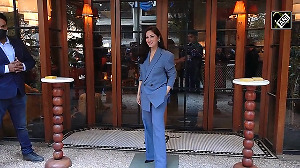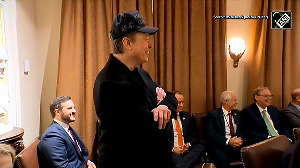 A shot of whiskey with water for me, and a glass of drinking chocolate for this bachcha (child)," Nadira instructed her maid.
A shot of whiskey with water for me, and a glass of drinking chocolate for this bachcha (child)," Nadira instructed her maid.
The icy chill of the actress' room (a noisy air conditioner was her constant companion; it kept at bay the din of the traffic on Mumbai's Peddar Road, four storeys below) was instantly offset by her warmth.
Sporting a nightgown, she was lying on her huge bed, smiling beatifically, even as she absentmindedly ran her hand over her forehead -- a trait that was so her.
She ribbed me good-humouredly in her 'propah', clipped English: "You don't look like you drink anything kadwa (bitter). And don't sit on the edge of the bed, you will fall off. Come closer and sit comfortably. I won't seduce you."
Even as I recovered my composure, she laughed her lungs out!
The year was 1983.
Twenty-three years later, not long before her death, she recalled our first meeting affectionately in one of our regular telephone conversations, and we shared a laugh.
'Nadira lived life on her terms'
| |||||||||||
Accompanied by my friends, I had gone to see Pyar Ka Rishta (a Mumtaz melodrama) while Nadiraji, accompanied by two ladies much older to her, had come to see herself in the film.
I nudged my friends and conspiratorially whispered, "Look, look, Nadiraji!" She turned around with a dramatic flourish, froze me with a look and challengingly shot back: "Yes, I am Nadiraji. So w-h-a-t?"
I will perhaps never know somebody quite as transparent, as direct, as her.
She was also, simply put, one of the most beautiful people I have known. When I read the headline 'Nadira is no more' in the morning papers, I found it so cold and reductive. And to add to my hurt, people were describing her as a lonely, fading star.
Nadiraji -- even after her death I can't call her by her real name Farhat, as she often egged me to -- was anything but a lonely and fading star.
Don't think Sunset Boulevard. She was a gregarious, articulate, erudite woman. Most importantly, she may have been god-gifted with a razor-sharp wit, but she was also overflowing with love, and was much loved herself.
Nadira: A woman ahead of her time
 Was she lonely? Let's say her need for company was acute. And insomnia was her biggest nightmare. But there was no dearth of people who loved her -- from neighbours in her apartment block to her watchmen to the many friends she had cultivated both within and outside the industry (like Shyama, Shammi aunty, Nimmi, Deepti Naval, Ameen Sayyani, Tanuja, Anil Virwani and Rati Agnihotri). And the list of people she loved would probably fill up a telephone directory.
Was she lonely? Let's say her need for company was acute. And insomnia was her biggest nightmare. But there was no dearth of people who loved her -- from neighbours in her apartment block to her watchmen to the many friends she had cultivated both within and outside the industry (like Shyama, Shammi aunty, Nimmi, Deepti Naval, Ameen Sayyani, Tanuja, Anil Virwani and Rati Agnihotri). And the list of people she loved would probably fill up a telephone directory.
For those who didn't know her personally, she was the spitfire of Aan (the blockbuster which introduced her to films as Dilip Kumar's heroine), the temptress of Shri 420 and the steel-willed mother of Julie (she won many awards for this role, which she played with an unconventional blend of sass and sensitivity).
But for me, she was my self-appointed friend who eventually settled down to being my 'mother'. We both enjoyed the fact that the other had an eye for spotting the absurd among the mundane. In a way, she was my mentor, philosopher and guide (how she would have chided me for using this clichéd phrase if she had read it in print -- 'think of something more original, beta, you owe it to me'). But I can't think of anything more apt.
What I found rare about her was her ability to combine humanism with intellect. Nadiraji was extremely possessive of her library. Keats and Mirza Ghalib rubbed shoulders with each other. Also, my first book, The Hundred Luminaries Of Hindi Cinema, found a place of pride. I have lost the one-rupee coin she gave me at the release of the book as aashirwad (blessing), but I can never forget the gesture.
Quoting Ghalib from memory was her favourite pastime. I had once borrowed a book of poems authored by Deepti Naval, and committed the cardinal sin of losing it. Nadiraji never let me hear the last of it. Fortunately, I chanced upon the book while spring-cleaning in Diwali, and returned it to her. Small gestures touched her no end, and she was magnanimous with her compliments. One day she called me to say, "Each time I open a drawer, I find a love card you have scribbled to me. Beta, I truly love you. You make me happy."
She wept like a child when I touched her feet on Diwali and gifted her a box of dry fruits. She would embarrass me no end thereafter by telling all and sundry, "Yeh mera beta hai. Yeh mere paon bhi chhoota hai aur kaaju bhi khilata hai (He is my son. Not only does he touch my feet, but he also gives me cashew nuts)."
When I asked her to step into Devyani Chaubal's shoes as a columnist for Movie after the latter's death, she surprised herself, not me, with her flair for expression. She would flatter me, "Mehboob Khan gave me a break an as actress, you helped me discover the writer in me."
She doted on my wife Anita and daughter Nikita. She would tell Anita, "You are a privileged one. One of the few people who can call me 'Aunty' and get away with it." She would also tell her, "Nikita is a brat who bullies her dad."
She would often ask me to bring my daughter over. But Niki was intimidated by Nadiraji's screen image. All my efforts to persuade her that Nadiraji was unlike her screen image couldn't convince her otherwise -- I consider that as the biggest compliment to Nadira, the actress.
Nadiraji was a raconteur par excellence and I could discuss films and filmstars with her for hours. She looked at filmstars with a level eye and held me enthralled with stories of Meena appa (Meena Kumari), Raj Kapoor (her rakhi brother) and the many-hued film people she knew. She would affectionately complain that Kapoor would be lavish with his love and miserly with his money. She would also grumble about how he stamped her with a vamp's image after she played the cigarette-smoking, money-gambling Maya in his Shri 420.
Though she rued the fact that Dilip Kumar never spoke to her during the making of Aan or thereafter, she grudgingly admired him as an actor. When she spoke about Meena Kumari (with whom she formed a deep bond during Dil Apna Preet Parayi and Pakeezah), she would invariably weep, copiously.
Nostalgia was a way of life with her. She never forgot her childhood days in Nagpada in Mumbai. It was difficult for her divorced mother to make ends meet, so her grandpa would instruct Nadira and her brother to ask the Pani Puri vendor to fill the Puris to the brim with paani (the sauce, mostly water), so that their bellies were full.
Her memories of the two broken marriages she had in the 1950s -- first husband Naqshab saab was a poet-filmmaker -- were laced with acerbic humour. In a moment of pique, she would not spare god either. She would wave a finger skywards and threaten: "You watch out, sonny. You have a lot of answering to do."
Right now, god must be in Nadira's court, quaking with mirth, if not fear. I am sure he will be amused by her no end. But we will miss her.
I have just one request to god. Please take care of her. She was a special woman.






 © 2025
© 2025